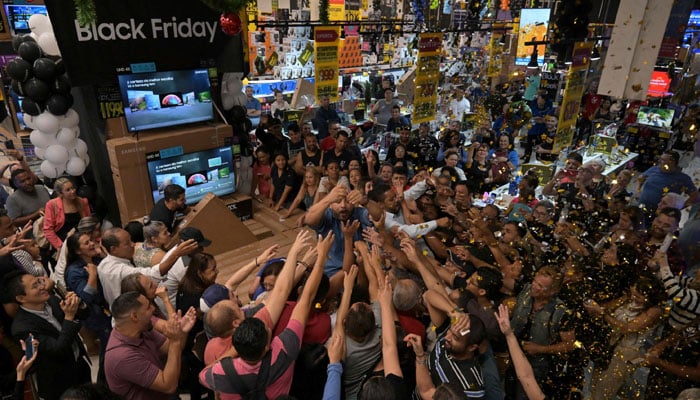Black Friday: Was it 1869 US gold market crash or slaves' clearance sale that started this tradition?
Black Friday's true story is not as happy-making as merchants would have you think
When the phrase "Black Friday" was originally used, it wasn't in reference to the post-Thanksgiving holiday shopping spree, but rather to the financial crisis, namely the September 24, 1869, crash of the US gold market.
Jay Gould and Jim Fisk, two infamously ruthless Wall Street businessmen, banded together to purchase as much gold as they could in the country in an attempt to skyrocket the price and sell it for phenomenal gains.
The scheme ultimately came to light on that Friday in September, plunging the stock market into complete collapse and bankrupting Wall Street titans as well as farmers.
The most often-told explanation of the Black Friday ritual associated with Thanksgiving shopping associates it with merchants. Legend has it that shops would allegedly turn a profit (or "go into the black") on the day following Thanksgiving after running at a loss (or "in the red") due to holiday consumers spending so much money on reduced goods.
While it is true that retail organisations historically recorded earnings in black and losses in red while completing their accounting, this official, if fictitious, origin tale for Black Friday is the tradition's genesis.
Another story that puts a particularly nasty spin on the custom has emerged in recent years. It says that on the day following Thanksgiving in the 1800s, Southern plantation owners could purchase enslaved labourers for a reduced price.
While some have rightly called for a boycott of the retail holiday Black Friday because of this story of the festival's origins, this idea is unfounded.
However, the true narrative of Black Friday is not as happy-making as merchants would have you think. When throngs of suburban shoppers and visitors descended onto the city the day after Thanksgiving to prepare for the annual Army-Navy football game, police in the city of Philadelphia used the phrase back in the 1950s to characterise the mayhem that resulted.
Police in Philadelphia were forced to work extra-long hours in order to handle the increased traffic and people, in addition to not being able to take the day off. To make matters worse for law police, shoplifters also took advantage of the chaos in stores and stole products.
By 1961, "Black Friday" had become so popular in Philadelphia that business owners and supporters attempted in vain to alter its name to "Big Friday" in order to shed its negative connotations.
However, the word didn't catch on in the rest of the nation until much later, and as late as 1985, it wasn't widely used. However, merchants managed to reimagine Black Friday somewhere in the late 1980s, making it a positive rather than a negative reflection on them and their clientele.
As a result, the previously described "red to black" holiday and the idea that America's retailers ultimately generated a profit on the day following Thanksgiving were born.
The tale of Black Friday became well-known, and before long, people hardly remembered the term's seedier origins in Philadelphia. Since then, the one-day sales extravaganza has expanded to four days and given rise to more "retail holidays" including Cyber Monday and Small Business Saturday/Sunday.
On Black Friday, stores began to open earlier, so that the most devoted customers could leave straight after Thanksgiving dinner.
-
Global memory chip crunch puts spotlight on Apple; Will iPhone become more pricey?
-
Bitcoin plummets toward $60,000 as investors dump risky bets
-
Bitcoin crashes below $63K as regulatory pressure and market fears grow
-
Bitwise Crypto Industry innovators ETF: What investors should do in 2026?
-
Nintendo shares slide again as momentum fears grow
-
Gold, silver prices fallen sharply; What’s driving the drop?
-
Gold’s record climb: Experts question if its safety is ‘overstated’
-
Dubai unveils plans to construct street built with real gold












